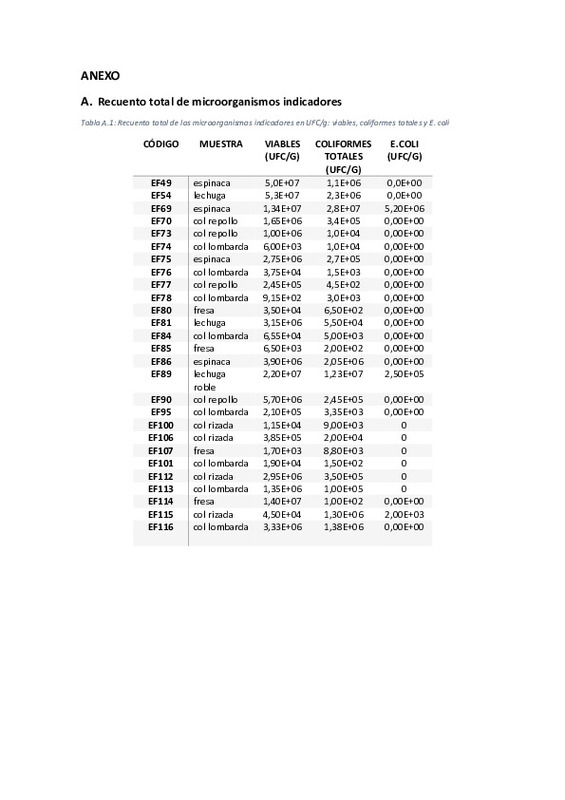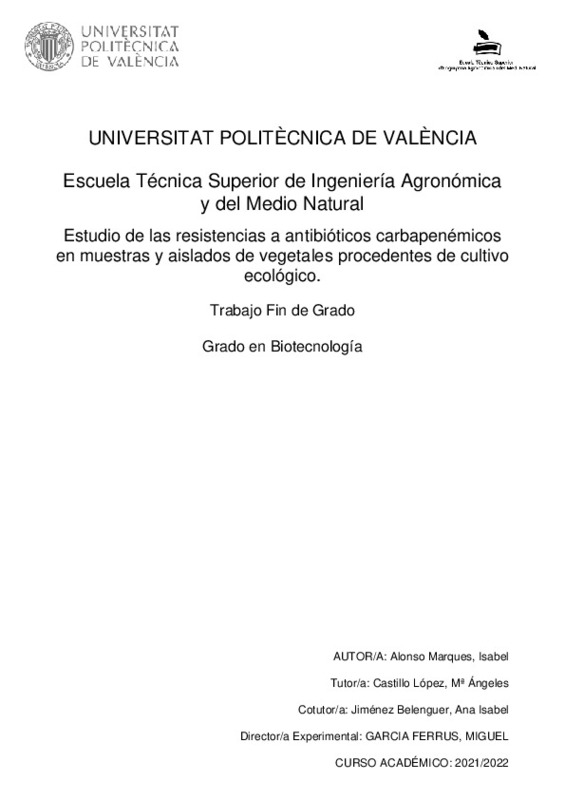JavaScript is disabled for your browser. Some features of this site may not work without it.
Buscar en RiuNet
Listar
Mi cuenta
Estadísticas
Ayuda RiuNet
Admin. UPV
Estudio de las resistencias a antibióticos carbapenémicos en muestras y aislados de vegetales procedentes de cultivo ecológico
Mostrar el registro sencillo del ítem
Ficheros en el ítem
| dc.contributor.advisor | Castillo López, Mª Ángeles
|
es_ES |
| dc.contributor.advisor | Jiménez Belenguer, Ana Isabel
|
es_ES |
| dc.contributor.advisor | García Ferrús, Miguel
|
es_ES |
| dc.contributor.author | Alonso Marques, Isabel
|
es_ES |
| dc.date.accessioned | 2022-10-21T09:01:53Z | |
| dc.date.available | 2022-10-21T09:01:53Z | |
| dc.date.created | 2022-09-29 | |
| dc.date.issued | 2022-10-21 | es_ES |
| dc.identifier.uri | http://hdl.handle.net/10251/188496 | |
| dc.description.abstract | [ES] Las bacterias resistentes a antibióticos (ARB) son una amenaza emergente para la salud humana, animal y ambiental. Su introducción en la cadena alimentaria tiene consecuencias a nivel de 'One Health'. Dentro de estos patógenos, los gram negativo de resistencia a carbapenemes son considerados por la Organización Mundial de la Salud (OMS) de crítica prioridad. Esto se debe a que los antibióticos carbapenémicos representan actualmente el agente más activo y potente contra patógenos gram negativos con resistencias a múltiples drogas (MDR) y no hay alternativas de tratamiento eficaces. Además, la incidencia de dichos patógenos ha aumentado en el último siglo y su infección se asocia a una tasa alta de mortalidad. La situación se agrava con la tendencia al alza del consumo de vegetales orgánicos y crudos, que al no ser tratados ni cocinados pueden ser un potencial reservorio de vectores bacterianos. En los últimos cinco años el crecimiento del gasto en productos ecológicos en España según el Ministerio de Agricultura y Pesca ha sido del 67,42%. En este trabajo se evaluaron muestras de espinaca, lechuga, col lombarda, col rizada y fresas de cultivos ecológicos de diferentes establecimientos minoristas de Valencia, con tal de determinar su papel en la transmisión de bacterias resistentes a antibióticos y sus genes. En primer lugar, se analizó la calidad microbiológica de las muestras a través de recuentos de microorganismos clave en el análisis higiénico sanitario (microorganismos viables aerobios mesófilos, coliformes totales y Escherichia coli). Los niveles encontrados solo fueron alarmantes para dos muestras, una de lechuga y otra de espinaca, en las cuales se superó los límites prestablecidos de E. coli. A continuación, se identificaron los aislados sospechosos de ser resistentes a cefalosporinas de tercera generación y carbapenemes, antibióticos de la familia de los ß-lactámicos. Tras ello, se determinaron sus perfiles de resistencia a través del método de antibiograma disco-placa, detectándose aproximadamente un 9 % de bacterias con multirresistencia. Para elucidar el origen de las resistencias, se estudió la presencia de genes de resistencia a carbapenemes (blaKPC, blaOXA-48, blaIMP y blaVIM) en las muestras y en los aislados. Dos de ellos, se detectaron en las muestras procedentes de TSB y tres en las cepas. Los resultados manifiestan el riesgo que conlleva el consumo en crudo de estos alimentos y la necesidad de lavarlos previamente a su ingesta. También reflejan el status quo de la prevalencia de ARB y ARG y el imperativo de establecer medidas de supervisión epidemiológica y de disminución de consumo de antibióticos. | es_ES |
| dc.description.abstract | [EN] Antibiotic resistant bacteria (ARB) are an emerging threat to human, animal and environmental health. Its introduction into the food chain has consequences at the level of 'One Health'. Within these pathogens, the gram-negative ones with resistance to carbapenems are considered by the World Health Organization (WHO) to be of critical priority. This is because carbapenem antibiotics currently represent the most active and potent agents against gram-negative pathogens with multi-drug resistance (MDR) and there are no effective treatment alternatives. Furthermore, the incidence of these pathogens has increased in the last century and their infection is associated with a high mortality rate. The situation is aggravated by the upward trend in the consumption of organic and raw vegetables, which, since they are not treated or cooked, can be a potential reservoir of bacterial vectors. In the last five years, according to the Ministry of Agriculture and Fisheries, the growth of expenditure on organic products in Spain has been 67,42%. In this work, samples of spinach, lettuce, red cabbage, kale and strawberries from organic crops from different retail establishments in Valencia were evaluated, in order to determine their role in the transmission of antibiotic-resistant bacteria and their genes. In the first place, a sanitary hygienic analysis took place through counts of key microorganisms (viable mesophilic aerobic microorganisms, total coliforms, and Escherichia coli) to establish the microbiological quality of the samples. The levels found were only alarming for two samples, one of lettuce and the other of spinach, in which the pre-established limits for E. coli were exceeded. Isolates suspected of being resistant to third generation cephalosporins and carbapenems, antibiotics of the ß-lactam family, were then identified. After that, their resistance profiles were determined through the disk-plate antibiogram method, detecting approximately 9% of bacteria with multi-resistance. To elucidate the origin of the resistance, the presence of carbapenem resistance genes (blaKPC, blaOXA-48, blaIMP and blaVIM) in the samples and isolates was studied. Two of them were detected in the samples from TSB and three in the strains. The results show the risk involved in raw consumption of these foods and the need to wash them before eating them. They also reflect the status quo of the prevalence of ARB and ARG and the imperative to establish epidemiological surveillance measures and to reduce the consumption of antibiotics. | es_ES |
| dc.format.extent | 1 | es_ES |
| dc.language | Español | es_ES |
| dc.publisher | Universitat Politècnica de València | es_ES |
| dc.rights | Reconocimiento - No comercial - Sin obra derivada (by-nc-nd) | es_ES |
| dc.subject | Análisis microbiológico | es_ES |
| dc.subject | Cultivo ecológico | es_ES |
| dc.subject | Verduras | es_ES |
| dc.subject | Fruta | es_ES |
| dc.subject | Viables aerobios mesófilos | es_ES |
| dc.subject | Coliformes | es_ES |
| dc.subject | Resistencia a antibióticos | es_ES |
| dc.subject | SS-lactámico | es_ES |
| dc.subject | Carbapenémicos | es_ES |
| dc.subject | Antibiograma | es_ES |
| dc.subject | Genes. | es_ES |
| dc.subject | Microbiological analysis | es_ES |
| dc.subject | Organic farming | es_ES |
| dc.subject | Vegetables | es_ES |
| dc.subject | Fruit | es_ES |
| dc.subject | Viable mesophilic aerobes | es_ES |
| dc.subject | Coliforms | es_ES |
| dc.subject | Antibiotic resistance | es_ES |
| dc.subject | SS-lactam | es_ES |
| dc.subject | Carbapenems | es_ES |
| dc.subject | Antibiogram | es_ES |
| dc.subject.classification | MICROBIOLOGIA | es_ES |
| dc.subject.other | Grado en Biotecnología-Grau en Biotecnologia | es_ES |
| dc.title | Estudio de las resistencias a antibióticos carbapenémicos en muestras y aislados de vegetales procedentes de cultivo ecológico | es_ES |
| dc.title.alternative | Estudi de les resistències a antibiòtics carbapenèmics en mostres i aïllats de vegetals procedents de cultiu ecològic | es_ES |
| dc.title.alternative | Study of resistance to carbapenem antibiotics in samples and isolates of vegetables from organic farming | es_ES |
| dc.type | Proyecto/Trabajo fin de carrera/grado | es_ES |
| dc.rights.accessRights | Abierto | es_ES |
| dc.contributor.affiliation | Universitat Politècnica de València. Departamento de Biotecnología - Departament de Biotecnologia | es_ES |
| dc.contributor.affiliation | Universitat Politècnica de València. Escuela Técnica Superior de Ingeniería Agronómica y del Medio Natural - Escola Tècnica Superior d'Enginyeria Agronòmica i del Medi Natural | es_ES |
| dc.description.bibliographicCitation | Alonso Marques, I. (2022). Estudio de las resistencias a antibióticos carbapenémicos en muestras y aislados de vegetales procedentes de cultivo ecológico. Universitat Politècnica de València. http://hdl.handle.net/10251/188496 | es_ES |
| dc.description.accrualMethod | TFGM | es_ES |
| dc.relation.pasarela | TFGM\150482 | es_ES |
Este ítem aparece en la(s) siguiente(s) colección(ones)
-
ETSIAMN - Trabajos académicos [3541]
Escuela Técnica Superior de Ingeniería Agronómica y del Medio Natural







